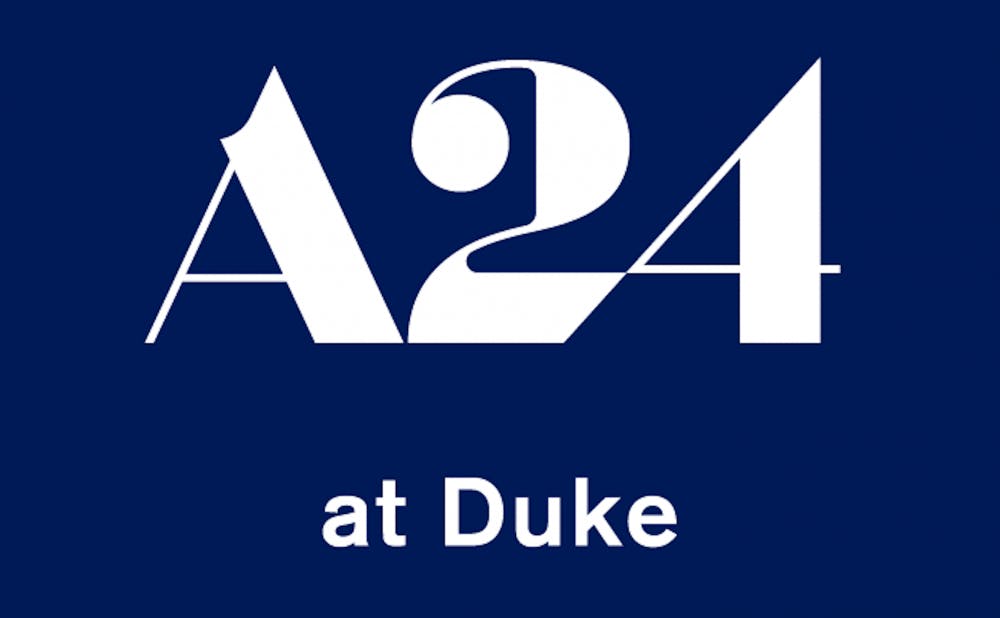Since its founding in 2012, the independent entertainment company A24 has quickly gained a reputation — at least among dedicated moviegoers — for putting out some of the most provocative and artistic films in popular cinema. This fall, the indie powerhouse is bringing its brand to Duke’s campus with a series of special events and screenings.
Senior Zoey Kang, who is an on-campus intern with the company, is leading the program, which seeks to raise awareness of A24’s work among the student body. Producing and distributing titles that often straddle the line between audience hit and arthouse darling, A24 is responsible for 2016’s Best Picture-winning “Moonlight,” last year’s coming-of-age drama “Lady Bird” and this summer’s horror sensation, “Hereditary,” among many others. With the partnership, Duke joins nine other colleges and universities throughout the country that are launching programs with A24, a list that includes schools, like UCLA, New York University and University of Southern California, that have well-known film programs.
“They just really want to get their culture, brand awareness of A24 out to people in our demographic,” Kang said of A24. “And being A24, they want us to be really creative with the way that we go about things.”
The partnership — whose Facebook page, “A24 at Duke,” has garnered over 160 likes since its launch in early August — began officially began this week with a poster giveaway on the Bryan Center plaza. Later in the semester, Kang has planned events for Homecoming Weekend, on Sept. 22 and 23, including screenings of A24 films “Eighth Grade” and “Lady Bird,” as well as a short film by Josh Kalejaye, Trinity ‘16, who recently received an M.F.A. in Screenwriting from the American Film Institute Conservatory in Los Angeles. Kalejaye’s film, presented in conjunction with the “Eighth Grade” screening, will be followed by a panel including a film professor and a psychology professor. With alumni back on campus for Homecoming, Kang joked, there was a definite “growing-up theme” to the selections.
To many, Duke may not have been an obvious choice as a location to market a relatively small, growing film company like A24. While the university has options for students interested in pursuing film as a career or simply as an academic passion — including undergraduate programs like the arts of the moving image certificate and the visual media studies major, as well as the M.F.A. in experimental documentary arts — Duke does not boast a unified film or television major, unlike its peers at UCLA and NYU. The lack of a central film program, Kang said, can make accessing Duke students with A24 films a somewhat difficult prospect. She compared many busy students’ attitudes toward film with their attitudes toward binge-watching television series.
“I feel like no one cares [about film],” Kang said, reflecting on her experience of returning to campus from the entertainment world of working in L.A. “And TV is more just watching ‘The Office’ to go to sleep. … I think the artistic, beautiful, cinematic works that A24 produces can help Duke students realize in general that it’s not just ‘The Avengers.’”
The presence of entertainment and film, however, seems to have grown significantly on Duke’s campus in recent years. An increased push toward funding for the arts — as evidenced by the opening of the Rubenstein Arts Center, which itself includes a soundproof theater with digital, 16mm and 35mm film projectors — along with popular student organizations like Freewater Presentations, Freewater Productions and Duke Film Club have contributed to film’s increased profile on campus.
Kang said that in its early stages, A24 at Duke will work with some of these clubs to establish its presence. She expressed hope, though, that the program would grow beyond her own involvement and attract new students to the partnership, perhaps even drawing students to film who might not have otherwise considered it.
“I just hope to … get students aware, not only of A24 and how they create films of such quality and uniqueness,” Kang said. “But also, hopefully, that can help Duke students realize that film is much more than what they’re used to.”
Get The Chronicle straight to your inbox
Sign up for our weekly newsletter. Cancel at any time.

